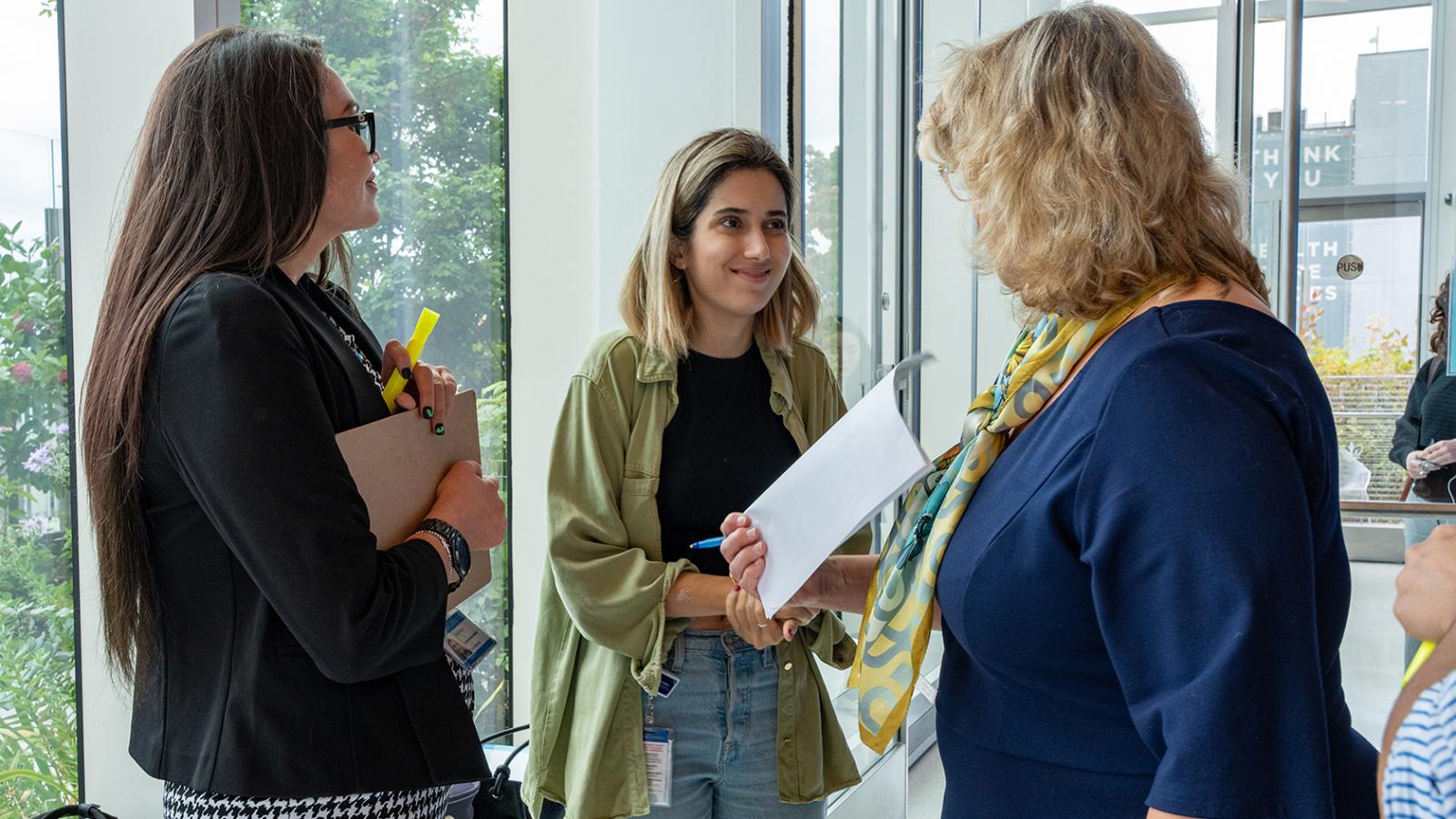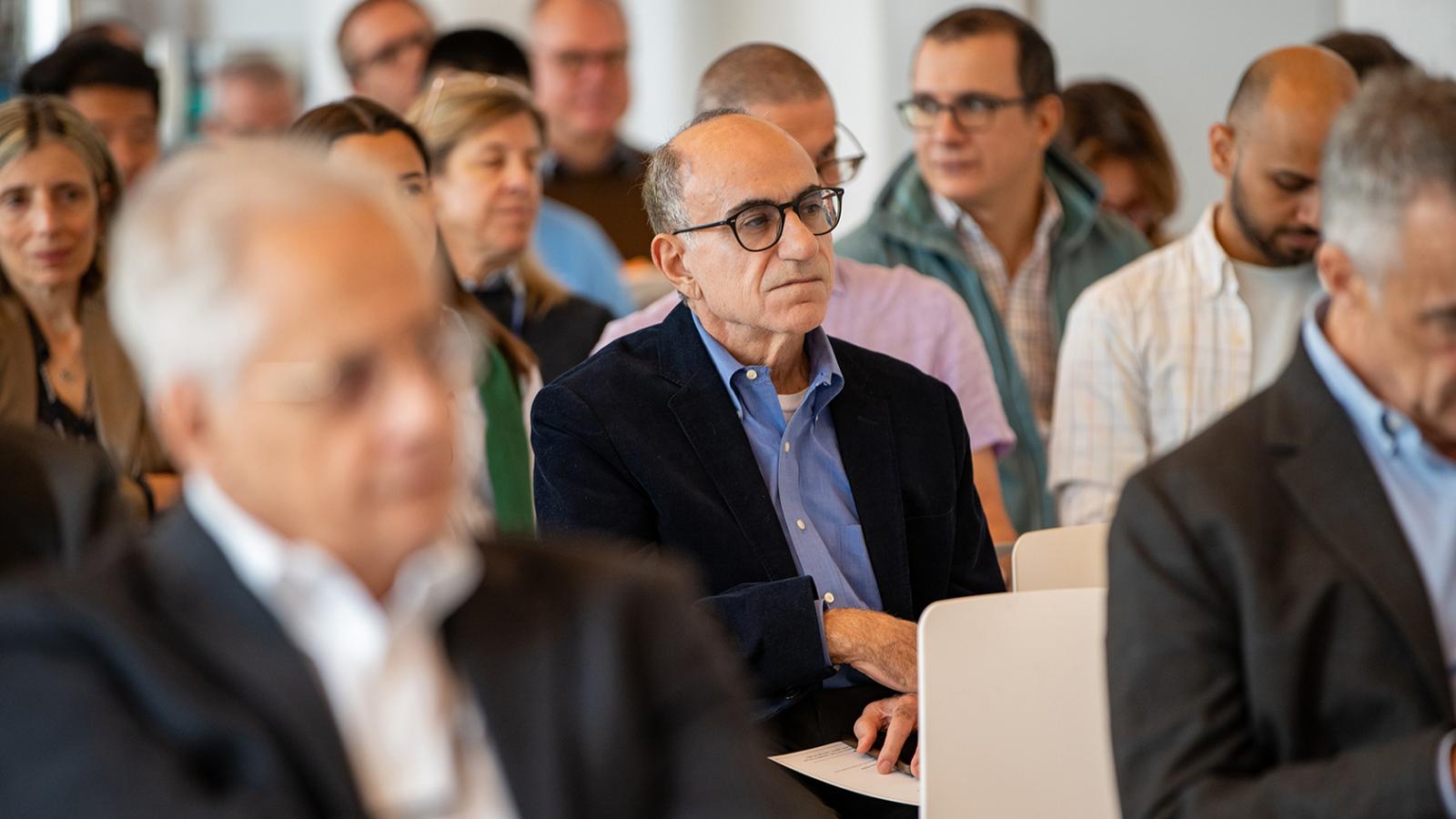
Afternoon of Science Series: Department of Systems Biology
The Afternoon of Science series at the Vagelos College of Physicians and Surgeons continued Sept. 25 with presentations from the Department of Systems Biology.
The event was hosted by the department's interim chair, Harris Wang, associate professor of systems biology, pathology & cell biology, and biomedical engineering, who shared his vision for the department. The Department of Systems Biology was founded in 2013 and now has more than a dozen primary faculty and 19 additional cross-appointed faculty members, who work to advance the integration of computational and experimental research methods in the biological and biomedical sciences. Research in the department is highly collaborative and integrates specialists in molecular biology, genetics, computational biology and bioinformatics, mathematics, chemistry and chemical biology, physics, and other fields.

Harris Wang
Looking to the future, Wang shared enthusiasm for areas of growth in the field, including foundational AI models for DNA, RNA, and proteins; ultra-high-throughput experimental biology and automation; cell therapies and living medicines; and genome medicine technologies.
“We’re excited for the launch of the Vagelos Institute for Basic Biomedical Research Education and its potential to catapult the next generation of basic science and graduate education here on campus for decades to come,” Wang said.
Faculty presentations were made by:
- Andrea Califano, President of the Chan Zuckerberg Biohub New York; Clyde '56 and Helen Wu Professor of Chemical Biology (in Systems Biology); Professor of Biomedical Informatics, Biochemistry & Molecular Biophysics, and Medicine (in the Institute for Cancer Genetics); and founding Chair of the Department of Systems Biology.
Presentation: “A Brief History of Time (and of the DSB)”
Califano is an internationally recognized pioneer in the reverse engineering of gene regulatory networks and in their analysis to identify key tumor checkpoint modules, whose aberrant activity is necessary for tumor viability. This has resulted in several clinical trials, including a very innovative N-of-1 study where patients affected by 14 untreatable, lethal cancers are analyzed on an individual basis to prioritize optimal therapeutic strategies. - Peter Sims, Associate Professor of Systems Biology and Biochemistry & Molecular Biophysics and Scientific Director, Sulzberger Columbia Genome Center
Presentation: “Systems Immunology in Human Tissues”
Sims’ research is focused on developing experimental and computational tools for genomic analysis with applications in cancer biology, immunology, and neuroscience. Researchers in his lab apply these tools in many areas of biomedical research, from the identification of cell-type-specific drug responses in malignant brain tumors to the understanding of tissue adaptation and function across immune cell lineages. - Sara Zaccara, Assistant Professor of Systems Biology
Presentation: “Unraveling the Epitranscriptome and its Impact on Disease”
Zaccara works in the field of m6A epitranscriptomics, a recently discovered post-transcriptional mechanism to control gene expression. Zaccara overturned long-held beliefs in the m6A field by proposing a unified model of how m6A mRNAs are controlled in cells. She leads an interdisciplinary RNA lab that aims to interrogate the mRNA life cycle with unprecedented throughput and resolution. - Dennis Vitkup, Associate Professor of Systems Biology and Biomedical Informatics
Presentation: “Systems Biology of Psychiatric Disorders”
Vitkup’s research develops and applies novel probabilistic techniques to analyze cellular networks. This involves developing methods that connect network structure to function and to phenotypes, which can be used to make experimentally verifiable predictions. Research in the Vitkup lab focuses on three main topics: 1) the global probabilistic reconstruction and analysis of metabolic networks based on completely sequenced genomes, 2) the development of methods to identify new human disease genes and genetic disease modules using probabilistic functional networks, and 3) the development of methods to combine mechanistic and probabilistic approaches for the dynamic simulation of biological pathways. - Mohammed AlQuraishi, Assistant Professor of Systems Biology (in Computer Science) and Member of the Program in Mathematical Genomics
Presentation: “Current Frontiers in Biomolecular Machine Learning”
AlQuraishi works at the intersection of machine learning, biophysics, and systems biology. The AlQuraishi lab focuses on two biological perspectives: the molecular and systems levels. On the molecular side, the lab develops machine learning models for predicting protein structure and function, protein-ligand interactions, and learned representations of proteins and proteomes. On the systems side, the lab applies these models in a proteome-wide fashion to investigate the organization, combinatorial logic, and computational paradigms of signal transduction networks. - Raul Rabadan, Professor of Systems Biology and Biomedical Informatics, Gerald and Janet Carrus Professor of Surgical Sciences (in Surgery and in the Institute for Cancer Genetics), and Director of the Program in Mathematical Genomics
Presentation: “Illuminating the Dark Cancer Genome using Foundation Models”
Rabadan leads a highly interdisciplinary lab with researchers from the fields of mathematics, physics, computer science, engineering, and medicine, with the common goal of solving pressing biomedical problems through quantitative computational models. The amount of high-throughput data in biological and clinical systems—from next-generation sequencing experiments to electronic health records—is increasing dramatically, allowing for the development of a quantitative understanding of these complex systems.




